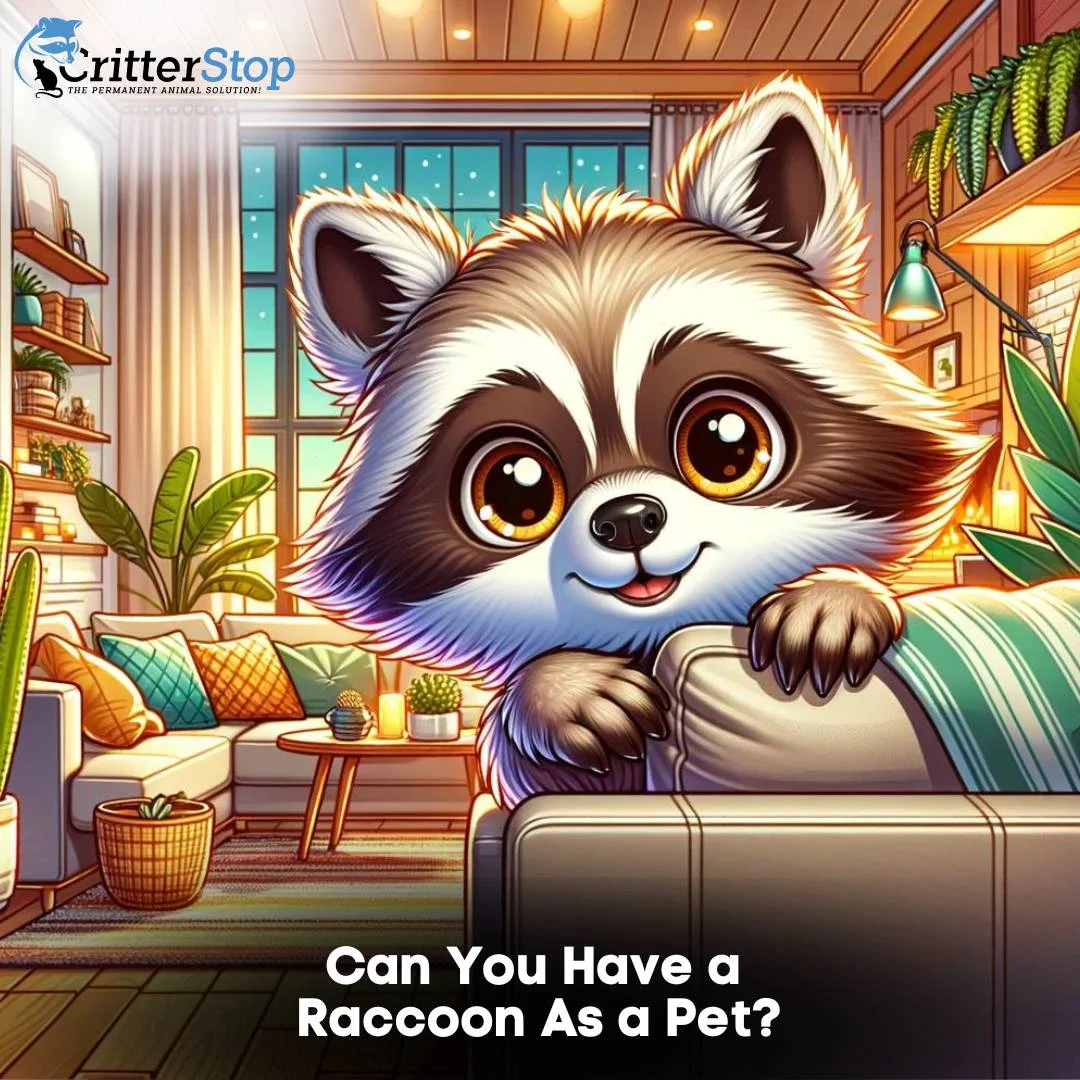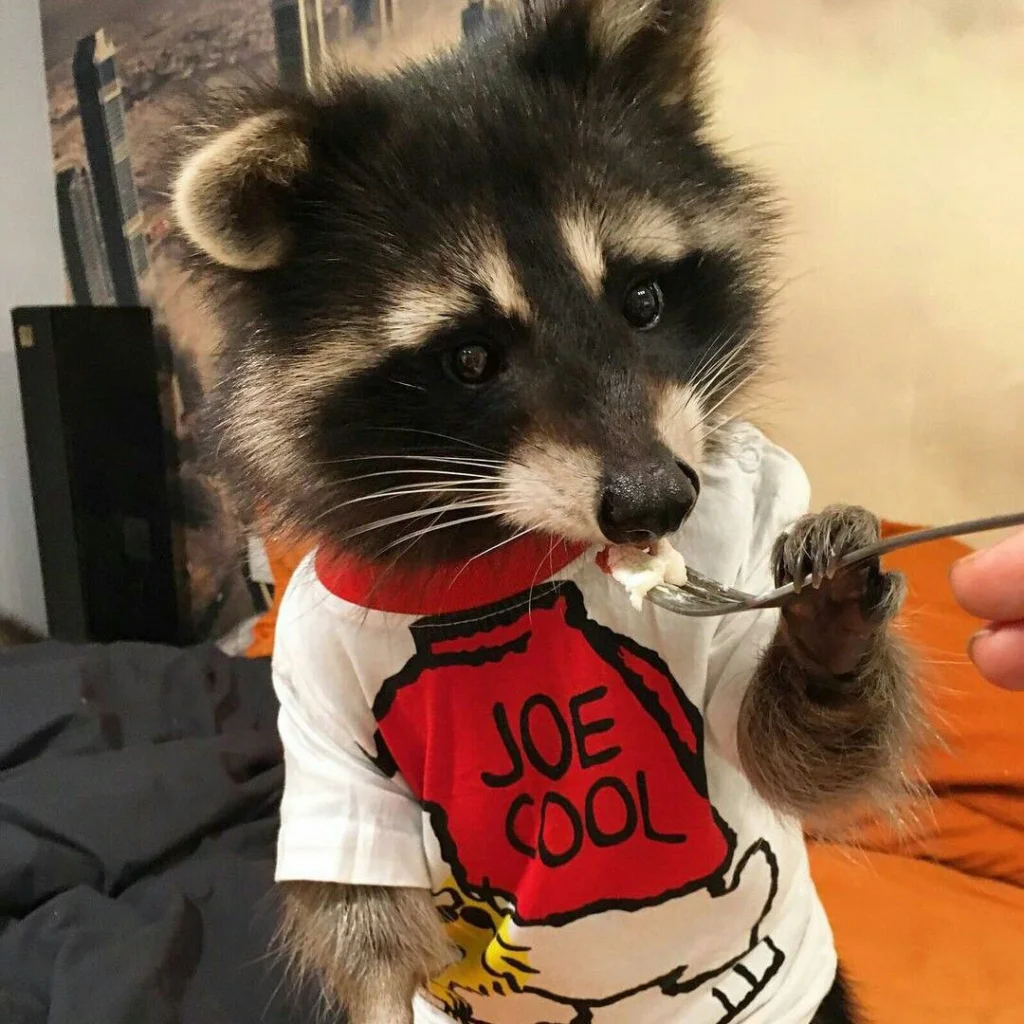
Amid the everyday routines, the idea of an exotic pet or wild animal brings a hint of excitement. Exotic pets are like windows to far-off lands, offering a touch of the wild in our own homes. They bring an air of the unexpected, a bit of the unknown, and a sense of adventure that's hard to resist.
Think about it – having a piece of a distant jungle or a slice of a foreign desert right beside you. Exotic pets transport us to places we've only seen in documentaries, bridging the gap between our everyday lives and the untamed world out there. In this article, we will answer all your interesting questions and help you think about whether can you have a pet raccoon.
Now, in the world of both exotic animals and pets, raccoons are like stars on the stage. They're not your everyday companions, and that's what makes them so intriguing. Raccoons have a mix of smarts, curiosity, and a dash of mystery that sets them apart.
First, their cleverness is remarkable – imagine having a buddy who can solve puzzles and figure things out. Then there's their playfulness – they're not just pets; they're like adventure partners, always ready to explore. But what really makes them stand out is their mischievous personalities.
In our experience dealing with wildlife, and especially with raccoons, we can tell you that each raccoon is a unique character with its own quirks and charms. Some might be little troublemakers, while others have a calm wisdom that draws you in.
In a world of endangered species where ordinary is the norm, raccoons offer a taste of the extraordinary, making them the perfect embodiment of the allure of exotic pets.

Before welcoming a raccoon into your home, it's essential to understand the legal landscape. The rules about owning exotic pets, like raccoons, are like a patchwork quilt – different in every state. Each corner of the country has its own set of regulations that outline what's allowed and what's not when it comes to keeping these unique companions.
Now, here's the catch: crossing the line into illegal ownership territory can bring a heap of trouble. Owning a raccoon in captivity without the proper permits or meeting the requirements set by your state or wildlife department can lead to some hefty consequences.
Imagine a not-so-welcome knock on your door – it might be the law enforcement, ready to hand out fines, and even take away your furry friend. Yep, that's right – you could lose the very pet you were hoping to cherish.

But don't worry – there's a path to legal raccoon companionship. In places where it's permitted, getting your hands on the right permits and ticking the necessary boxes is the way to go.
These permits aren't just pieces of paper; they're the golden ticket to responsible ownership of game animals. They're there to make sure you and your captive raccoon-hunting buddy are set up for a life together that's safe and fulfilling.
In a world where rules can be difficult to understand and diverse as the animals themselves, understanding and respecting the legal side of raccoon ownership is like laying the groundwork for a happy and trouble-free companionship.
In our specific case, at Critter Stop we constantly receive from our customers an interesting question: can you have a raccoon as a pet in Texas? The answer is no, in Texas, it is generally not legal to keep a raccoon as a pet. While some states may have provisions that allow for raccoons to be kept as pets under certain conditions, Texas requires a special permit for people who want a raccoon, and these are not typically granted for pet purposes.
According to Texas Parks and Wildlife Department (TPWD), raccoons are classified as fur-bearing animals, and one would need a fur-bearing animal breeder's permit to own one. However, these permits are usually for individuals who are breeding fur-bearing animals for commercial purposes, not for keeping them as personal pets
Raccoons are like nature's poets – their hearts beat to the rhythm of the wild. They're wired with instincts that have been honed through generations, tailored for survival in the great outdoors. These instincts aren't just surface-level traits; they're the essence of who raccoons are.
Picture this: a raccoon's innate urge to forage for food. It's not just about getting a meal; it's about embracing a dance with nature. When we have provided raccoon removal services, we have found that they are expert scavengers, exploring their surroundings with an insatiable curiosity it's like a necessity for them.
This curiosity, while charming in the wild, can sometimes lead to, well, surprising discoveries when they're living under your roof.
Now, let's talk about the journey of turning a wild raccoon into a domestic one. It's like taming a free spirit while honoring its untamed essence. Domesticating a raccoon is like guiding a wanderer into a new world – a cozy world that can be a bit confusing for our wild-hearted friends.
Their wild behaviors, like climbing anything that stands tall and investigating everything that piques their interest about the size, can sometimes lead to a bit of chaos and even produce some damage to the home
Imagine finding your kitchen cabinets rearranged by curious little paws or your favorite scarf making its way to an inventive nest. It's not that they're causing trouble; they're just following deeply ingrained instincts.
So, while the idea of having a raccoon as a companion is intriguing, it's essential to remember that their wild nature might paint your home with a few unexpected brushstrokes. Domesticating them requires patience, understanding, and a bit of acceptance of the wild heart within. Remember, raccoons are normally active throughout the night, so keep this in mind, because your sleeping hour can change a bit.

Raccoons and dogs might be charming, but they come with their own health considerations. One of the animal most major red flags is the risk of zoonotic diseases, and the big one on that list is rabies. Raccoons are potential carriers of this serious disease.
Close contact with them increases the chance of transmission to humans, fish and even other animals. It's like a health minefield that requires careful navigation.
Sure, cats and raccoons have that adorable factor, but it's vital to remember that they aren't plush toys. They come with sharp claws and teeth, tools that nature equipped them with for survival.
Interactions can lead to scratches and bites, and this becomes especially concerning when there are children around. It's like having a cute but unpredictable playmate in the house.
Think about this – Raccoons are wired to explore forests, climb trees, and forage for food. But in a domestic setting, these natural behaviors might get a bit lost in translation. The result? Stressed-out pet raccoons that might struggle to adapt.
Stress isn't their only concern; their complex dietary and enrichment needs might not be fully met, leading to health problems. It's like trying to fit a square peg into a round hole – it doesn't quite match up.
If you're thinking about starting this adventure, as a raccoon removal expert, we strongly recommend visiting a veterinarian first, not only for your safety but also to understand the risk that our night friends could face changing their living area for your house.
Where cuddles and care meet health and safety, it's essential to strike a balance. Owning a raccoon isn't just about having an adorable friend; it's about taking on the responsibility of ensuring their well-being and the safety of your family, furry or otherwise.
Caring for a raccoon as a pet is like being a chef with a unique menu. Raccoons have particular tastes and dietary needs that aren't your run-of-the-mill pet fare. Meeting these needs in a home environment is like solving a puzzle. From insects to fruits, including the water, the variety is vast, and each item plays a role in their health. It's like trying to create a gourmet meal plan that keeps them thriving.
Once again, the best way to get an efficient menu for your wild pet is to call a vet who has experience with wildlife animals, especially raccoons. Doing this is the only way to ensure proper alimentation.
Remember, raccoons aren't just adorable faces; they're brilliant minds housed in those fluffy bodies. They need mental and physical workouts to keep boredom at bay. Failing to engage them can lead to behavioral troubles that leave both you and them feeling less than joyful. Think of it like this – imagine having a pet genius who needs a daily dose of challenges to stay happy.
Raccoons aren't short-term flings; they're long-term commitments. Their lifespans can stretch over a decade, demanding a steadfast dedication to their well-being. It's like a promise to be their guardian throughout their journey of life. From the energetic days of youth to the serene moments of old age, your care and commitment remain constant.
Here's a truth to ponder: The choices we make affect more than just our homes. Taking raccoons from their natural habitats or releasing them back into the wild after domestication can ripple through ecosystems. Their absence or presence in natural habitat can tip the balance of flora and fauna, shaping local environments in unexpected ways.
Ethics treads softly through the world of pet ownership. Keeping a wild animal as a pet poses questions about freedom, welfare, and companionship. While it's enchanting to share your days with a raccoon, the responsibility of providing a fulfilling life for threatened species while respecting their wild essence requires careful consideration.
The challenge of raccoon ownership beckons us to be not just caregivers of nuisance wildlife but also stewards of our species, their well-being and the world around us.
Feeling the call of the raccoon but unsure about the commitment? Fear not. Supporting wildlife conservation and rehabilitation centers is a noble route. These centers are like sanctuaries for creatures in need, including raccoons. By contributing your time, resources, or funds, you can play a vital role in their care and rehabilitation. It's a chance to be part of their journey without bringing them into your home.
Imagine this: the thrill of observing how raccoons live in their element, just as nature intended. Wildlife watching or photography offers a respectful way to witness their behaviors without disturbing their lives. It's like being a respectful guest in their world, learning their stories while leaving no footprint behind.
Owning a raccoon isn't a decision to be taken lightly. It's a mix of delight and dedication, with joys and challenges intertwined. From their intelligence to their wild hearts, pet raccoons can bring a unique dynamic to our lives. But alongside the joys, the practicalities, risks, and responsibilities of owning a pet raccoon also must be considered.
As the curtain falls on the raccoon's tale, remember this: informed choices are the foundation of a harmonious companionship. The allure of having a raccoon as a pet is undeniable, but this decision carries weight. It's about treading the path of responsibility with care, ensuring not just your happiness but the well-being of these remarkable creatures. At Critter Stop, we have dealt with raccoons for years, so we know a lot about their behavior, diet, and more. If you have any questions, please feel free to call us at (214) 234-2616 and we will be there for you!
Visit our Critter Library and learn more about our furry friends